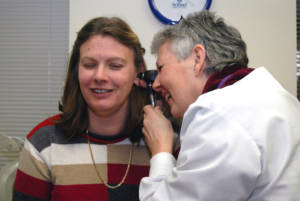What Causes Ear Infections?
An ear infection is a common cause of distress in young children and can also affect adults. This condition can lead to hearing loss and necessitates surgery if not diagnosed and treated early. Review the symptoms, causes, diagnosis, and treatment of ear infections.
What Causes Ear Infections?
Ear infections are caused by swelling or blockage of the eustachian tube, often referred to as Eustachian Tube Dysfunction. This tube runs from the middle ear to the back of the throat and plays a significant role in ensuring the ear stays dry and clean. The eustachian tube can sometimes become dysfunctional due to colds, excess mucus, allergies, smoking, changes in air pressure, and swollen adenoids. This then inhibits proper air circulation in the ear and may cause fluid accumulation behind the eardrum. The moisture from accumulated fluids and warmth creates a suitable breeding ground for bacteria and viruses, which may lead to an ear infection.
Symptoms of an Ear Infection
Symptoms of ear infections can either occur periodically or persistently. A double infection (infection in both ears) may cause more severe symptoms compared to an infection in one ear. Some of the symptoms include draining fluids from the ear, pain, and hearing trouble. Infants and young children suffering from this condition can experience additional symptoms: tugging at an ear, loss of balance, fussiness, fever, headache, trouble sleeping, and/or appetite loss.
Diagnosis and Treatment
Seeking medical attention after exhibiting the signs of an infected ear can help to prevent extensive damage to parts of the ear. A physician examines the ear(s) and eardrum by looking for air bubbles, pus-like fluid, and a perforated, bulging, or collapsed eardrum.
If an ear infection is suspected, it is common practice to evaluate the patient’s hearing. Typically, fluid behind the eardrum will cause hearing loss that is not permanent, called conductive hearing loss. It is important to note that fluid can be present behind the eardrum but not be infected. When it is determined that the fluid is infected, this is called an ear infection and requires treatment with antibiotics as well as possibly a decongestant that is prescribed by a physician.
It is important to seek medical intervention for fluid in the ear and/or ear infections because left untreated, fluid can wreak havoc on the structures of the ear. A patient may undergo a CT scan to assess the extent of the infection if it is left untreated for an extended period of time or if the infection is chronic and will not go away with treatment.
Seeking specialized care when experiencing the symptoms of an infected ear can alleviate the condition and bring comfort. At Associated Hearing Professionals, we provide specialized hearing health services aimed at maintaining ear health. Call us to book an appointment and learn more about our compassionate and comprehensive care.

